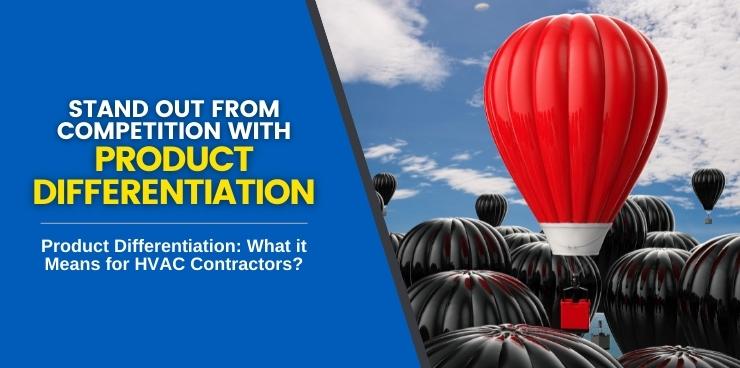Knowing what makes your company different from your competitors, or better yet, creating the value that distinguishes your business from the Sea of Sameness is the secret to exponential profitable growth. Our most astute residential home service clients all have meaningful differentiators that stand them 600 ft above the competition.
I call that your perfectly fair competitive advantage — I’ll explain this in a jiffy. As we discuss product differentiation in this article, we’ll explore how you can find yours too.
Nowadays, when most people think about product differentiation, they think of innovative companies like Apple and Samsung. For these companies, product differentiation is key to their success. But what about those companies that aren’t creating products or introducing new innovations?
Imagine trying to choose between two products that are exactly the same. It’d be impossible to find a reason to settle for one over the other.
It’s essential that business owners understand the raw power of differentiation. The most common method is to focus on a specific niche and craft solutions that attract customers and address their actual felt needs through pain and pleasure points.
But what does that mean for an HVAC contractor?
In order to stay ahead of the competition and attract new prospects, contractors need to offer something unique and valuable. Something that all your competitors wouldn’t immediately shoot their hand up and say, “ME TOO”! Leveraging product and market differentiation are essential to setting yourself up for success.
What Precisely is Product Differentiation?
Business differentiation is essential, but it’s especially important in a highly competitive and saturated industry, like HVAC. By offering something unique and valuable, you can attract new customers and keep existing ones loyal for years to come.
For example, instead of offering the standard rip and replace, a product differentiation strategy could be adding a free blower door test to optimize the energy efficiency of every HVAC installation. This add-on ensures clients can choose what to spend. A right-sized system and more effective insulation can save a customer thousands of dollars on less expensive, more energy efficient equipment, and redistribute those dollars to sealing up all the existing air loss. You can also sell add-ons like HRVs/ERVs for a newly sealed home as well.
The great thing about this different service is that you’re likely the only one with that extra expertise and equipment necessary to corner the market. Moreover, you can leverage this value for higher CAP clients (converting today at a higher average sale and profit) who are happy to oblige — that’s what a perfectly fair competitive advantage is. After all, any of your competitors can offer what you offer if they are willing to invest in figuring it out. Many will try. Most will fail.
It’s about finding the locus that makes your company different through stupefying value.
Now, there are several ways to differentiate your company, but it’s important to choose the right one for your business.
Like the example above, product differentiation is the method of offering unique services or products. This could also be anything from green HVAC solutions to 24/7 virtual emergency service. Whatever you choose, make sure it’s something that speaks to the actual felt needs through pain and pleasure points.
Product differentiation works best for businesses that have the following characteristics:
- Simple.
- Speaks loudly to a universal felt need.
- New, interesting, and different.
- Within your CORE competency.
When you resolve an anxiety or frustration for the largest group in your population with a no-brainer concept that you can deliver with your eyes closed better than anyone else, you win. Tell that story over and over again in a new, interesting, and different way and you’ll capture the hearts of your prospects unlike anything your competitor could ever hope to achieve.
If you need help with product differentiation strategies for your HVAC company? Book a demo with Wizard of Sales® today.
Service Differentiation
Another effective strategy is service differentiation, one form of competitive differentiation. It involves offering unique services to your customers that your competitors won’t immediately attempt to replicate.
Service differentiation could include a concierge service, 24/7 virtual service techs, or a maintenance program.
By offering these types of differentiated services, you can make it harder for your competitors to attract and retain customers against your offering.
Market Differentiation
Market differentiation is being perceptually different in your market. While all the competitors are zigging, you’re zagging. When what you do resonates with your prospects, both customers and candidates alike, you win. .
I can’t help but think of Ismael Valdez at Nexgen in California when I think of a market disruptor. Ismeal has a singular goal to right the wrongs he has faced in the residential home service market and went about figuring out how to do right for people. From sales to operations, his message struck a cord that saw his meteoric rise to fame.
Be forewarned, however, as there are many more ways to get things wrong than right. Start off by figuring out what kind of discipline you want your company to follow, and stick to it.
By finding ways to make your products and services stand out from competitors, you attract more customers and candidates who want to be a part of your tribe.
Specific Areas That You Can Differentiate Your HVAC Services or Product
Product differentiation comes in all shapes and sizes. Each one yields a different result. It’s crucial to understand the distinction and assess which makes sense for your HVAC business.
Every customer looks at price. How does your price compare to competitors? If you’re unsure, now is the time to do some market research. Look at what your competitors are charging and find ways to differentiate your company.
All things being perceptually equal, a customer will always gravitate towards the cheaper price. Anyone can carge less, but that doesn’t make them the lower priced solution when considering all of the costs, including the opportunity costs, costs of ownership, and the toll it can take on a buyer’s mental health to deal with an inferior solution.
Alternatively, increasing your price in exchange for staggering perceptual value is the superior (and more profitable) product differentiation strategy.
Every customer looks at price because the money they spend requires an investment in time and energy. If the Money, Energy, Time equation results in a a negative, you have yet to provide enough value for your solution. Since value is a subjective measure in your buyer’s perceptual reality, you cannot make something that is arguably valuable more valuable to a person who doesn’t value it.
That means jut because something has intrinsic worth, doesn’t mean it matters in your sale until you can either change your buyer’s belief, or remove the item from the equation.
- Quality
Another way you can differentiate your HVAC products and services is with perceived quality.
Are you investing in better quality materials compared to your competitors? Do you have a quality assurance process in place? What kind of quality controls do you consistently implement? Why? Do the buyers know your why?
Are your products and services backed by warranties and guarantees? What makes them different? Meaningful? Valuable? Can you competitors quickly say, “me too”?
Quality is indicative of durability. Conceptually, buying more durable products lowers the cost of ownership and add to the longevity of the solution. When your customers believe they are buying a superior quality (at a fair premium) they are most interested in the right solution, not the lowest price (within reason). Again, it comes down to the Money, Energy, Time equation of value.
- Reliability
Having a reliable product means having a durable product. With proper preventative maintenance, your good quality products are reliable. Are you putting in unreliable products though? If you are, that product is representing you as poorly as an unskilled Technician ever could.
Your actions are also an indication of reliability. Do you consistently show up when you say you will? Do you reschedule what you perceive as low priority work (like preventative maintenance) when demand service spikes?
Is your buying experience consistent from one technician to the next? Do your customer come to depend on your consistency, or are they afraid of it?
Prioritizing reliability will help you build a solid reputation. One of the most effective strategies is robust upfront communication.
For example, due to the unpredictable nature of weather as you move into peak season, you may not want to promise, or even offer preventative maintenance. If instead, you created a clear and compassionate way to communicate your capabilities to serve them best in both the shoulder seasons and the peak seasons, you could manage expectations better upfront and keep the majority of people quite happy with how you deliver your services.
This means taking a hard look at why you would separate Technicians into Maintenance and Service Techs. If you hope to stablize your staffing needs, and serve your customers best, building out careerpaths and adjusting your onboarding can make a monumental difference to your buying experience.
- Safety
Safety can be perceived from a variety of angles. Prospects want to be safe with your employees in their home, with your company’s policies and pricing, and with the products you place in their home.
People want to know you’ve installed it safely, that the product is designed with safety in mind, and that all the reasonable safety precautions have been put in place.
They also want to be safe from being taken advantage of or having a creepy person in their house. What most companies get wrong is presuming the minimum standards expected in society today are the things worth speaking about. They are not. To be truely different, you need to have stories about safety that demonstrate how you do things differently to get it right the first time.
Performance
Performance goes beyond efficiency and durability. One of the most prolific examples in HVAC is the whisper quiet performance of the Bosch systems. People literally gush over how quiet they are. This is product differentiation at it’s finest.
Don’t forget to include product demonstrations whenever you can. It’s one thing to do a bunch of mind numbing math to validate the energy efficiency of a high-efficency, variable speed motor, it’s another to show them a video of how effortlessly it works in comparison to a single stage system.
Make the process as simple as possible for customers. Every bit of effort into your differentiation strategy goes a long way.
- Comfort
Like safety, comfort is multi-facited. Delivering comfort in HVAC is obvious, as it is with plumbing. The cool air kissing your skin on a hot day. The warmth of a hot shower when you wake up.
Comfort extends far beyond the obvious though. The comfort one has when using the thermostat. The convenience of programming, smart apps, and monitoring sensors.
Comfort even extends to the comfort of knowing they are dealing with a trustworthy and customer-centric comapny with their best intentions at heart. Comfort is about addressing botht he physical and mental needs of a buyer to make thier lives more pleasant in every way.
- Customization
It’s essential to offer customize for people who are shopping for the right solution. Your offerings should meet the specific needs of your customers. After all, no two homes are exactly alike. Each will have its own set of heating and cooling requirements.
Get to know your clients’ individual needs. This may involve conducting an initial assessment of their home, the system, and the customer’s needs. Your solution can follow the tenants of mass customization, as long as you build the right bundles for your customer’s actual felt needs. Because buyers want wide selection, quick, competent service, and low prices, managing your inventory and selection strategy is essential.
- Post-sale support
Differentiating your post-sale support is paramount for long term loyalty and unsolicited referrals. It’s not the first sale that generates incremental provit, rather the second and subsequent sales that follow.
When you provide a world-class buying experience for every customer, from the initial call to the post-service follow-up, you are certain to have them coming back for more.
What ways can you stand out in your post-sale follow up, product support, and relationship building? Don’t be the troublesome child only calling when you want something from mom and dad.
Your HVAC company’s brand image is critical if you want to stand out in a competitive marketplace. Reflect on your company’s purpose and values. Do the things you say match the buying experience? Do your employees believe in what they sell? Are you consistently following through on your promises?
This will help prospects understand what you’re all about and why they should choose you over other options. Needless to say, your brand image covers everything from your company values from your communication to your commitments.
You’ll want to make sure that your brand image matches the customers you’re trying to attract, and make it real. If you need help with this, hop on a phone call with us.
2 Categories of Product Differentiation
Aside from the types, there are also two categories of product differentiation to consider. The first is one you have the power to control. The second category, however, relies on the customer base you build as your business grows.
 Vertical Product Differentiation
Vertical Product Differentiation
Vertical product differentiation includes any factor that is measurable. Examples of factors used to differentiate products vertically include the safety, performance, appearance, comfort/convenience, efficiency, durability, and price you choose to sell.
Differentiation based on quality (performance and durability) is perhaps the most common form of vertical product differentiation. A product with higher quality than competing products always commands a premium price.
Too many features, on the other hand, have to be carefully balanced. A product with too many features can be perceived as overpriced and frivolous.
Horizontal Product Differentiation
Horizontal product differentiation includes factors that aren’t measurable. Horizontal product differentiation depends solely on the customer’s personal preference. For example, a consumer might like Carrier more than Lennox.
Building customer loyalty will come as you build your customer base that is attracted to the solutions you provide, and the values you hold.
Pros and Cons of Product Differentiation Strategy
In a nutshell, a product differentiation strategy is the lynchpin to market domination. To sumemrize how it might affect your HVAC business, here are some pros and cons:
Pros
- Added value. Both pricing and brand perception have the potential to add value.
- Develop customer loyalty. Building a brand image that customers trust will develop loyalty.
- Dominate the market. Product differentiation types allow companies to compete with more important factors than price.
Cons
- ROI isn’t guaranteed. The only aspect you can control is your differentiation strategy. A return on investment isn’t guaranteed and depends on whether you’ve captured lightening in a bottle (or not).
- Perceived value might decline over time. New offers that you create might spark interest in your target audience for a while, and then fizzle out. Look to satisfy actual felt needs, not superficial wants and desires.
- Might drain assets and resources, especially for small business owners. Utilizing product differentiation in your business is an investment. Be sure to assess your budget before testing out your strategy.
Product differentiation is all about leveraging what sets you apart from your competitors. Take your own competiecies, audience, and competition into consideration. Remember, every great marketing strategy takes time to establish trust.
If you aren’t different in your offering from other HVAC contractors, make your own perfectly fair competitive advantage.
Wizard of Sales® is always willing to help you find that low-competition, high-profitability, and oozing-with-value market space. Book a demo to corner your HVAC market!



 Performance
Performance Vertical Product Differentiation
Vertical Product Differentiation